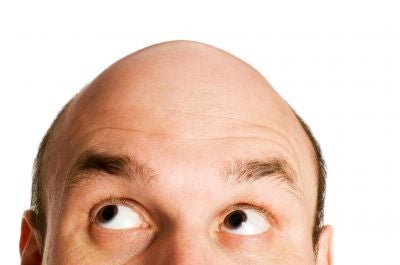Your support helps us to tell the story
From reproductive rights to climate change to Big Tech, The Independent is on the ground when the story is developing. Whether it's investigating the financials of Elon Musk's pro-Trump PAC or producing our latest documentary, 'The A Word', which shines a light on the American women fighting for reproductive rights, we know how important it is to parse out the facts from the messaging.
At such a critical moment in US history, we need reporters on the ground. Your donation allows us to keep sending journalists to speak to both sides of the story.
The Independent is trusted by Americans across the entire political spectrum. And unlike many other quality news outlets, we choose not to lock Americans out of our reporting and analysis with paywalls. We believe quality journalism should be available to everyone, paid for by those who can afford it.
Your support makes all the difference.Men taking the drugs Propecia and Proscar (finasteride) for hair loss are reporting some seriously bad sexual side effects, including loss of sex drive and in some cases prolonged periods of erectile dysfunction even years after they stop using the medications, according to a new study.
Announced on March 14, the study, from The George Washington University School of Medicine and Health Sciences in the US, involved interviews with 71 healthy men taking finasteride for male pattern hair loss. Of the men studied, 94 percent said they developed low sexual desire, 92 percent said they developed erectile dysfunction, 92 percent said they developed decreased arousal, and 69 percent said they developed problems with orgasm.
Men in the study reported they used finasteride for an average of 28 months. The sexual side effects were reported to have lasted "an average of 40 months from the time the men stopped finasteride to the interview date," according to a release.
Another similar study announced on January 12 reports that men using Propecia may experience loss of libido, erectile dysfunction, and even growth of man breasts. In addition to Propecia, the study cited drugs such as Avodart (dutasteride) as having similar side effects.
In better news, earlier this year researchers discovered what may be an underlying cause of male pattern baldness: an inability of stem cells in the scalp to develop into the type of cells that make hair follicles. The discovery, published on January 4 in the Journal of Clinical Investigation, could give hope to men and women with hair loss, said the researchers in a release.
Last year, researchers also discovered a new gene related to hair loss that might facilitate therapy for many concerned. As reported by the science journal Nature, they found out that the gene APCDD1 is often responsible for so-called male pattern baldness, a hereditary process beginning during childhood. Officially termed hair follicle miniaturization, this process causes thick, dark hair to be replaced by much finer hair.
The new study will be published in the upcoming issue of Journal of Sexual Medicine.
Read about hair loss and prevention here:
http://www.myhealthnewsdaily.com/hair-loss-alopecia-treatment-0251/
Watch a video on ways to prevent balding: http://www.youtube.com/watch?v=2GHvyt6EdDI

Join our commenting forum
Join thought-provoking conversations, follow other Independent readers and see their replies
Comments